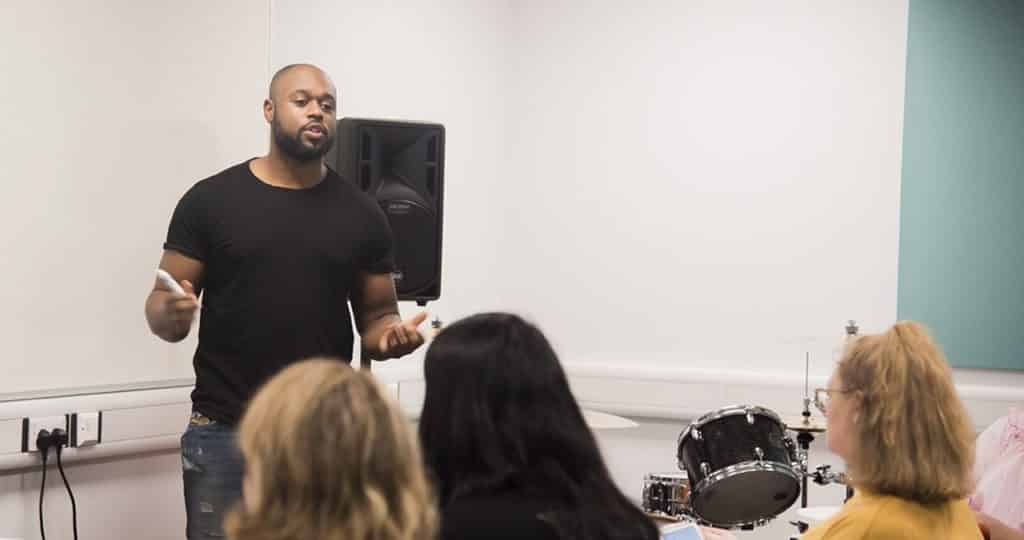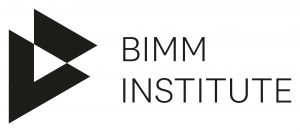MA Learning & Teaching in the Creative Industries
The MA Learning & Teaching in Creative Industries has been thoughtfully designed to suit both new and experienced educators. This course encourages growth, no matter whether you’re starting your journey as a teacher or looking to deepen your existing knowledge, skills and experience. It’s both flexible and comprehensive, giving you the tools you need to lead the way in the education sector.
By the end of your course, you can expect to be a highly creative, thoughtful and collaborative educator with the skillset to succeed in both further and higher education. You’ll develop your skills, knowledge and agency as a teacher, and you’ll learn to use educational theory and undertake your own primary research. We take a highly person-centred approach, offering expert tuition, one-to-one mentoring, engaging practical workshops and guided independent study.
Aside from skills development and knowledge acquisition, you will learn to critically examine and challenge beliefs and attitudes in order to find your own voice as an educator.
Focus areas include:
- Teaching and supporting learning
- Assessment and feedback
- Learning theory and psychology
- Inclusivity and accommodation for learning needs
- Creative and experiential approaches to learning
- Educational and practitioner-led research
- Course design
- Critical and social theories of education
- Coaching and mentoring in one-to-one settings
- Leadership and innovation in education
Which pathway is right for you?
This MA is offered in two distinct pathways:
The ‘Initial Teacher Education’ pathway: designed for early and pre-career teachers
The ‘Initial Teacher Education’ pathway focuses on developing your own practical and reflective skills within the classroom. It includes the introductory module, ‘Teaching, Learning and Assessment’, for which no prior teaching experience is required.
You will also undertake a work placement, which is comprised of teaching experience and lesson observation. This forms the requirements for professional formation (QTLS) through the Education & Training Foundation. Teaching placements are offered for those not currently working within education.
This pathway is offered both full-time over one calendar year (three semesters) and part-time over two calendar years.
The Experienced Educator pathway: designed for qualified teachers or those with over three years of teaching experience
You’ll expand upon what you already know and complete the programme with deeper theoretical and pedagogic knowledge that will enrich your teaching. This includes exploring new practices in leadership and educational change.
Because our flexible MA courses provide an educational experience that works around you, this pathway is offered part-time over two calendar years so that you can continue with your day-to-day profession.


Course specification
Mode of attendance: Full-time (one year) or part-time (two years)
Study format: in-person classes supplemented by online tutorials and distance learning
Course structure: four taught modules plus a double-weighted research dissertation (Initial Teacher Education pathway includes teaching placement)
Calendar: Trimester One (September-January), Trimester Two (January-May), Trimester Three (May-August)
Awarding institution: BIMM University
Campus delivery: Brighton and Bristol
Language of study: English
Final award: MA Learning & Teaching in Creative Industries
Minimum requirements
- A good degree (normally 2.2 or above) or significant professional experience in the creative arts/industries.
- Overseas students for whom English is not their native language may be required to meet a minimum English language requirement of an Academic IELTS 6.5. We require a minimum of 6.0 to be achieved in each band.
- Exceptions apply. Please contact [email protected] for more information.
- All applicants will be subject to interview and a portfolio may also be requested for Recognition of Prior Certified or Experiential Learning (RPCEL).
Progression
- Graduates will be qualified to work as teachers, tutors, administrators and leaders in creative arts institutions at further education and higher education levels.
- They will also be able to use the course to develop their self-employed careers, which could include one-to-one teaching, creative workshops, curriculum consultation or developmental coaching.
- Graduates can also progress into an academic research career through undertaking a doctoral study (PhD or EdD).
Please note: module names and structure may be subject to change.
Core module on Initial Teacher Education Pathway Only
You will engage in a broad range of learning and teaching techniques suitable for roles in post-compulsory education. The module develops competencies in planning, teaching, assessing, giving feedback and supporting different forms of learning. As an introduction to the course, no prior teaching experience is assumed.
Assessed by practical micro-teaching and written coursework.
Runs throughout Trimester One (Sept-Jan).
Core Module on Experience Educator Pathway Only
This module focuses on the concept and practice of leadership, defined as mobilising people to effect change, within contemporary education. We adopt an individualised approach, helping you to ‘learn to lead’ and ‘lead to learn’ in your own educational contexts which can include both formal and informal roles.
You are given the opportunity to develop and reflect on different styles and approaches relating to leadership and leading change across a range of professional contexts. You will investigate a personally significant leadership challenge, with the support of colleagues and peers on the module.
Assessment format depends on the topic of the investigation (written and/or multimedia).
Runs throughout Trimester One (Sept-Jan).
Core module on both pathways.
What is creative education – Is it education in creative subjects; a more creative approach to education in creative subjects; or a more creative approach to all education? This module invites you to explore such questions in the context of your own professional and creative practice, through engagement with theories of creativity and contemporary perspectives on creativity in education.
You will engage in experiential workshops in order to practise techniques that expand your practical skillsets as a creative educator. We encourage you to experiment with your own learning and creative practices, to try new things in your teaching, and to explore how assessment decisions are made and justified within creative subjects.
Assessed by a portfolio of learning (written and/or multimedia).
Runs throughout Trimester Three (May-August).
Core module in both pathways.
This module grapples with a variety of real-world theories and practices of research used to investigate education and the creative subjects.
You will learn to use different methodologies of qualitative and practitioner research in order to better understand your learning and teaching and answer larger questions about creative education.
For the module’s assessment, you will generate a research proposal, which can be used for your final research dissertation/project.
Runs throughout Trimester One (Sept-Jan).
Optional module available for both pathways
In this optional module, you’ll engage with a range of critical positions on education and the curriculum, exploring what, how and why we teach.
You will explore the variety of aims and ideologies at play within education and critically engage with ideas from the social sciences, psychology and education in analysis and debate. These conversations will inform your own educational practices.
Assessed by a written essay or presentation.
Runs throughout Trimester Two (Jan-May).
Optional module are available on both pathways.
This optional module supports you in developing short courses across a range of academic and professional settings in creative subjects. You will look at a variety of methods and orientations to curriculum design, including examining digital and blended learning approaches applicable to courses on and offline, as well as managing individual and collaborative learning.
For the module’s assessment, you will create and evaluate your own short course of study, allowing you to develop usable design and materials for your own professional career. The submission is via portfolio (written and/or multimedia).
Runs throughout Trimester Two (Jan-May).
Optional module available on both pathways
This optional module facilitates your development as an effective coach and/or mentor in one-to-one settings. You will explore a variety of person-centred techniques and approaches for partnering with learners to support their development and empower them as individuals. This can provide an additional professional skillset for work as an educator, and it can inform your existing one-to-one and classroom teaching.
You will participate in your own coaching/mentoring practice throughout the module and will receive professional supervision from an expert coach.
Assessed by a reflective portfolio of practice (written and/or multimedia).
Runs throughout Trimester Two (Jan-May).
Core module on both pathways
This module provides the opportunity to produce an extended piece of educational research that explores an area of your academic interest or professional practice. In addition to regular peer-led seminars, you will receive individual tutorials from an experienced research supervisor.
Runs throughout Trimester Two and Three (Jan-August).
Course fees
| Postgraduate courses | UK/Irish students | EU/International students | UCAS code |
|---|---|---|---|
| MA Learning & Teaching in Creative Industries (full-time) | £9,950 | Full information on EU and international student tuition fees can be found here. | N/A |
| MA Learning & Teaching in Creative Industries (part-time) | £6,450 (per year) | N/A |
Graduates will be qualified to work as teachers, tutors, administrators and leaders in creative arts subjects at Further Education and Higher Education levels.
They will also be able to use the course to develop their self-employed careers, which could include one-to-one teaching, creative workshops, curriculum consultation or developmental coaching.
Those who go on to gain QTLS status via the Education & Training Foundation are also legally qualified to teach in UK Schools.
As with all BIMM University MAs, graduates can also go on to study at doctoral level (PhD or EdD) to progress their academic careers as educational researchers.
Examples of recent alumni career destinations include:
- FE Audio Production Lecturer in FE (DV8 College)
- Private singing teacher & vocals coach (London)
- PhD researcher (University of Central London)
- Learning Support Specialist (East Sussex College)
- Drama Schoolteacher (KS3-4)
Any questions?
For any questions regarding our courses or if you’d like more information on how to apply to BIMM Music Institute, please contact our Enquiries Team on 01273 840 346 or email [email protected].


